Tarot Wyzdom with Love: Making Sense of The Major Arcana
When Alice fell down the rabbit hole the whole world seemed to have gone crazy.
However, when we really look at her experiences and the archetypes of characters she met along the way, we can see symbols of life and experiences begging to be examined.
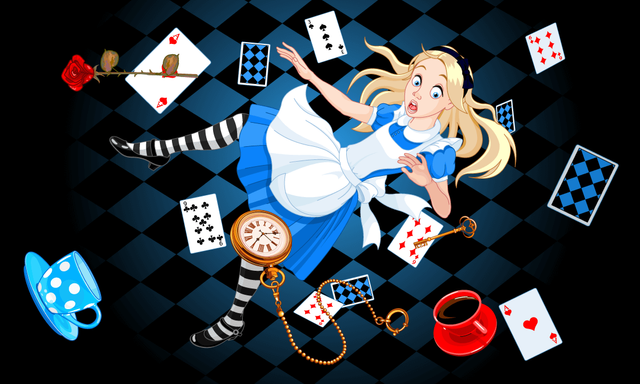
Then, there’s Dorothy and her classic yellow brick road, also yet another story comparable to the lessons and archetypes of the Major Arcana.
The lessons of our own personal Wonderland and Oz easily compares to the 22 cards contained in the Major Arcana of the tarot. Mostly because it’s message comes on many levels. This group of the tarot cards can appear really wacky but simultaneously very deep and complicated, as volumes and volumes have been documented about them.
There are numerous methods and approaches to looking at these cards. Our challenge is to introduce them to you in the most simple manner and give you many doors from which to choose for continuing your personal exploration and inner journey.
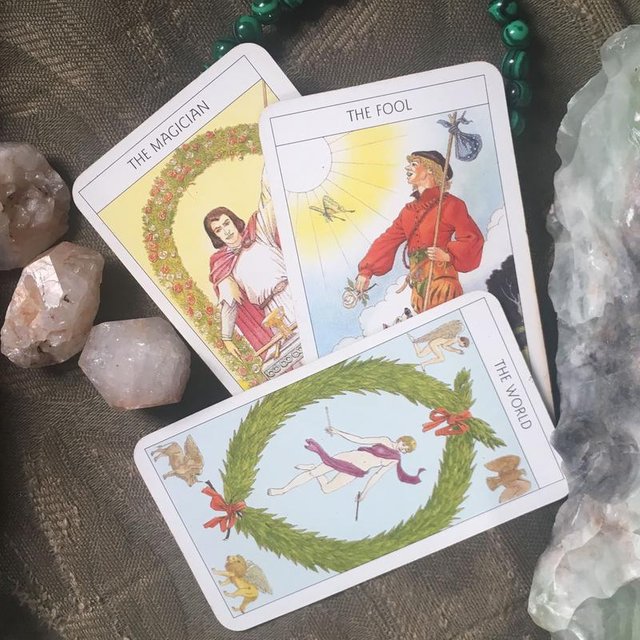
Before we dive in it’s important to address that you have a good tarot deck for genuine study.
If you don’t know what a good tarot deck is then, go ahead and click over to our second post in this series of 10 articles. These are specially designed to quickly get you using your cards like a pro.
9 Important Things to Know for Choosing and Cleaning Your First Tarot Deck
If you missed the first post in this series,
7 Steps in 30 Minutes or Less to Learn the Tarot Cards,
, here is the link to get you caught up.The third article is
Tarot Wyzdom with Love: How to Dissect the Tarot Cards
. Great basic stuff!The fourth article in this series is 4 Easy Steps to Conquering the Court Cards.
These articles all build on each other or can be used as a stand-alone to address specific topics.
When exploring the Major Arcana it is relevant to take into account that there is no way you could ever know everything there is to know about these cards. This is why these cards are so compelling to countless people.
Similar to a rabbit hole or a yellow brick road, the journey you take depends on you. The manner in which you explore the 22 cards of the Major Arcana is all up to you.
Among many others here is a list of relevant Major Arcana components or
possible avenues of study:
- Astrology
- Numerology
- Colors
- Kabbalah
- Hebrew alphabet
- World history
- Quantum physics
- Biology
- Psychology
- Constellations
- Much, much more
Without writing volumes, there’s no way we can explain everything to know about the Major Arcana in this short blog. Therefore, we feel a simple chart for introducing some of the aspects of the Major Arcana then following up with some avenues of possibilities to continue researching those parts which most interest you is the best mode of procedure.
Before we jump into it, it’s important to discuss how to use these cards in a reading. When the Major Arcana cards come up in a reading:
- Don’t think about it too hard or second guess yourself! Don't do it!
- Only consider the symbols that first come to you. If you try to address everything in the card you will be off track. That is not the point or purpose.
Major Arcana represents the soul or spirit journey
rather than the physical body on earth when it comes up in a reading.
For example:
The Empress might address creativity and abundance on a soul level, as an issue that’s been carried from lifetime to lifetime.
The Queens of the Minor Arcana, on the other hand, will represent the physical, present earthly life issues in the area of creativity and abundance.
The more Major Arcana cards in a spread,
the more the outcome is about overcoming
old stuff, and
old patterns from
old lifetimes.
Study and explore the aspects of the tarot cards that interest you the most.
If astrology is your thing then follow astrology. If ancient Egyptian history fascinates you then follow that...and so on, using tarot as your jumping point.
Below, there is a list of resources for you to follow up on for your personal exploration.
In a reading, with practice, you will be able to bring those elements into the reading, giving more well rounded information and an easy fluidity of the story.
Always remember
The way you see it, at first sight, is never wrong. Trust yourself.
Reference the first article in this series for additional information, “7 Steps in 30 Minutes or Less to Learn the Tarot Cards”, on how to easily give tarot readings.
With that said…
The chart below is incomplete. Each student of the tarot will complete the chart on their own.
Each student will have:
- their own perspective,
- their own subconscious warehouse of memories in which to access.
Carl Jung says we already know what the cards mean as they have always been etched within our deep psyche.
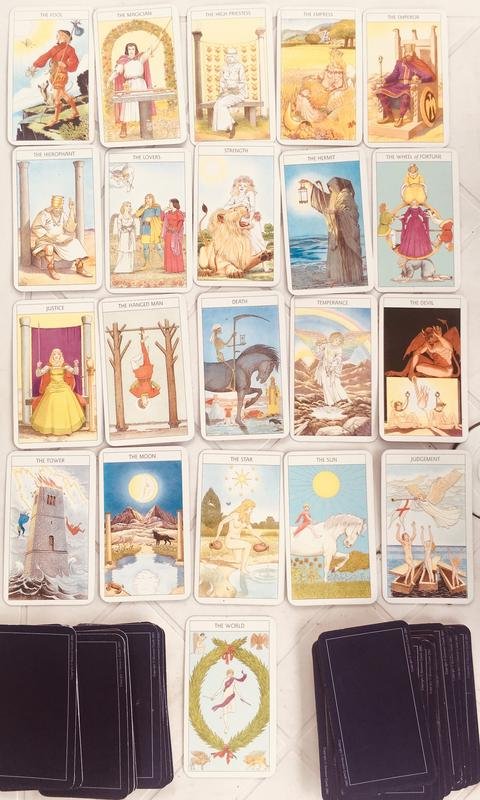
Rachel Pollack, multiple award-winning author, in her classic book (Highly Recommended!), Seventy-Eight Degrees of Wisdom: A Tarot Journey to Self-Awareness explains the Major Arcana as,
“...of these twenty-two images many can be interpreted as simply a catalogue of medieval social types, such as (to give them their later names) 'the Pope' or 'the Emperor', or else common medieval moral homilies, such as 'the Wheel of Fortune'. Some represent virtues, like 'Temperance' or 'Fortitude'. Others show religious-mythological scenes, such as the dead rising from the grave at the trumpet call for 'the Last Judgement'. There is even a card depicting a popular heresy, the image of a female pope, which we can describe as a joke on the Church with rather deeper significance than most ecclesiastical humour. Still, we can view this heretical picture as deeply rooted in popular culture, and therefore obvious to someone representing medieval 'types'.
S. L. MacGregor Mathers, leader and creator of The Golden Dawn and catalyst for the foundation of the tarot we are most familiar with today says in his book entitled simply, The Tarot, It’s Occult Significance, Use in Fortune-Telling and Method of Play, Etc,
“…22 symbolical picture-cards answering for trumps. These latter are numbered from 1 to 21 inclusive, the 22nd card being marked Zero, 0. The designs of these trumps are extremely singular, among them being such representations as Death, the Devil, and Last Judgement, &c.”
Paul Foster Case, a student of MacGregor Mathers explains about the Major Arcana in his classic book, Oracle of the Tarot (Out of Print)
“...shows the attributions of the major trumps of Tarot to the letters of the Hebrew alphabet, and to the elements, planets, and signs of the zodiac which are attributed to those letters in the Sepher Yetzirah, or Book of Formation.”
As Case suggests, the Hebrew alphabet is a great path of study. With that in mind, I must admit I personally have been drawn to studying through the window of the Hebrew alphabet and Numerology. Both have led me down unexpected rabbit holes and yellow brick roads.
Through the study of the Hebrew alphabet I found the mystical Kabbalah which is a whole other gateway of exploration unto itself. Then, numerology is connected to the science that creates all things and has given new understanding of the power of sound vibration, quantum physics and sacred geometry. Who knew?!
I never expected to learn and know now what I now know...just from following what, in the beginning, seemed like simple interests.
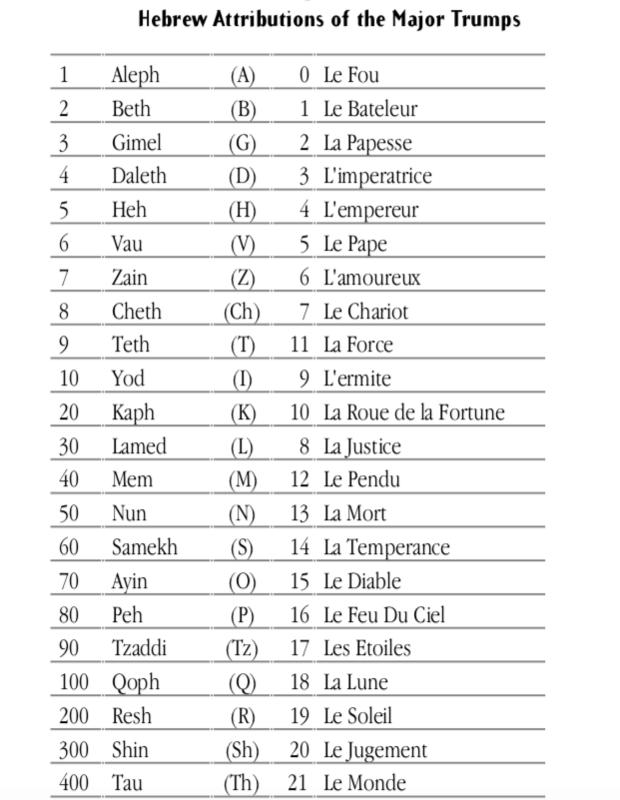
Screenshot from Oracle of the Tarot by P F Case.
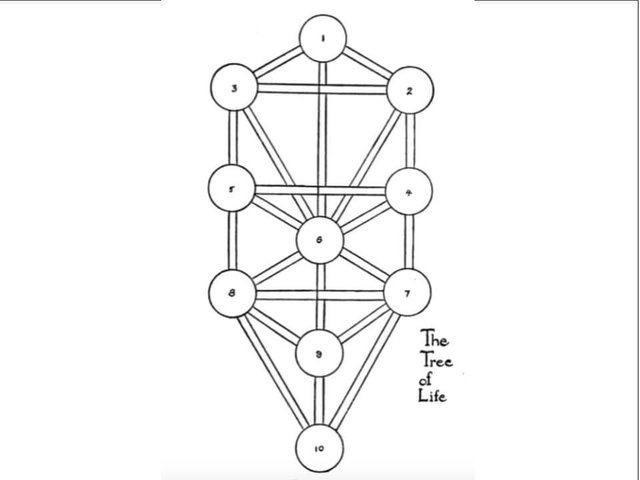
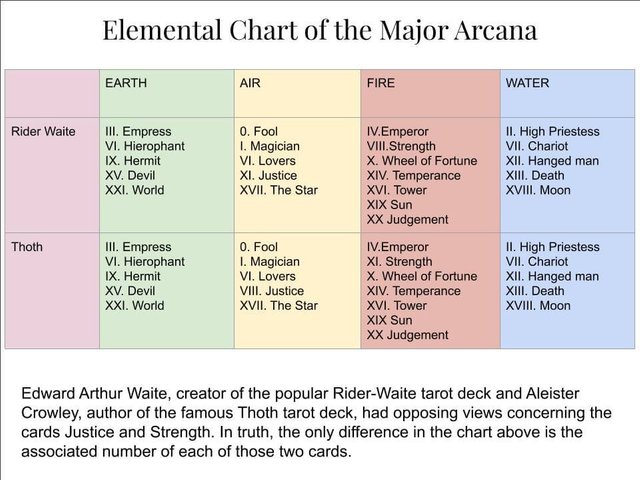
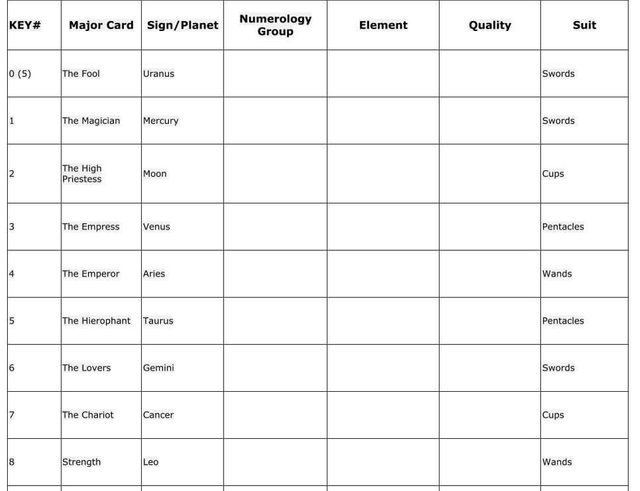
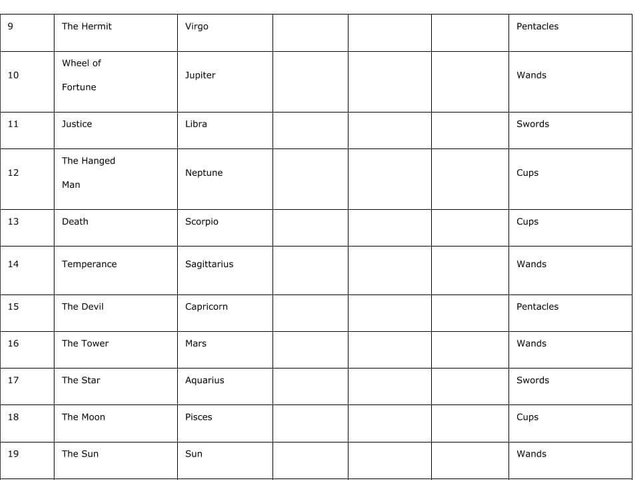
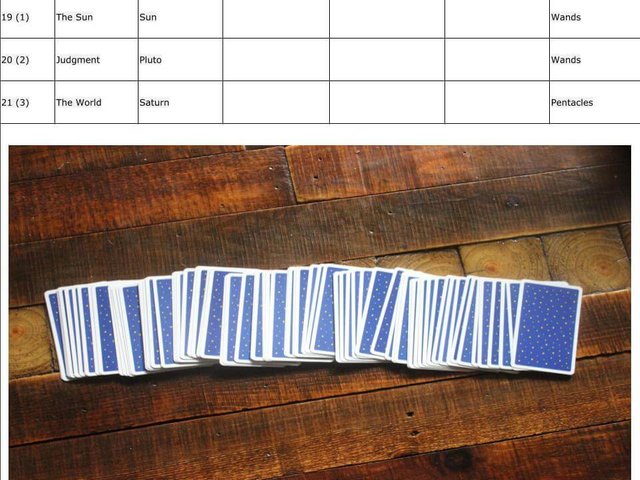
How to use the above chart:
- The chart above, you can print up and fill out in any manner you would like. I have already filled out some of the columns for you.
- Numerology Group Column - fill in with the Hebrew name for each letter. Also, beginning with the #10 begin writing in the numerology value of each card. For Example: In the associated box for 10 you will write “1” because 1 + 0 = 1 and so on for the others.
- The Element will be one of the following:
- Earth
- Air
- Fire
- Water
- In the qualities column, fill in information based on what you know, either from your head and heart and/or from looking it up in a book or website.
For example: The Empress = abundance, nurture, creativity
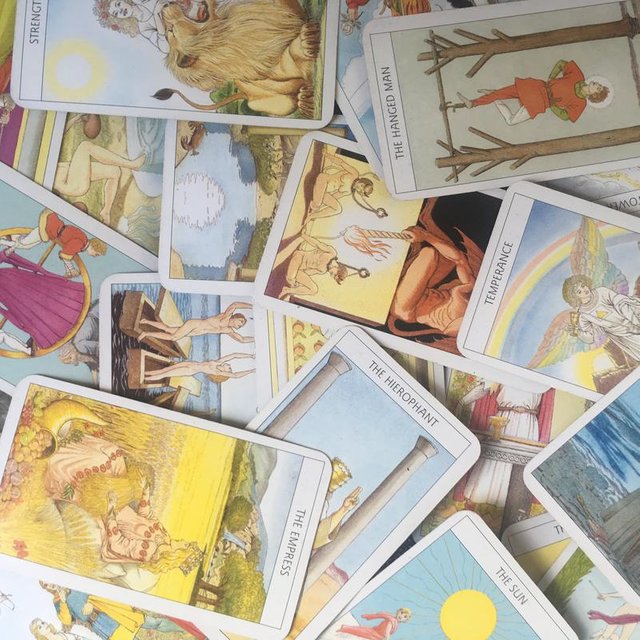
Using the charts and the directions listed above, doing some of your own searches and checking out some of the great suggested books below you can bring clarity, organization, and simplicity to what at first appeared to be a crazy rabbit hole or an endless search for Oz.
---------------------------------@@@@@-----------------------------
ACTIVITIES:
The Major Arcana truly lends itself to some fun activities. In addition to the ones listed here, also go back to the article 4 Easy Steps to Conquering the Court Cards as those activities are easily adaptable for the Major Arcana being that the characters in this section also have distinct personalities.
Major Arcana Storytelling:
Play with a group of two or more. The more people, the more fun. You will need a long table and some way to keep time for one to three minutes.
- Separate the major arcana from your tarot deck. Shuffle. Place stack face down on the table.
- Taking turns, the first person pulls the top card and lays it face down near the center of the left end of the table. Begin timer for any agreed-upon time before you begin. One minute is a good start for tarot newbies.
- Begin the story with whatever comes up in your mind based on what you see in the card. Try beginning with, “Once upon a time…” or “There once was a man/woman who…” or, “In a land far, far away there once lived a…”.
- When the timer goes off the first person stops talking even if he is in the middle of a sentence. The next person draws the next card and places it on the table next to the first card then immediately picks up the story and continues it based on the second card. The timer will run again for one minute.
- Continue until all 22 cards are played or stop at an agreed-upon amount of turns for each player.
Tarot Journaling: (There are many books written on this topic.)
- Obtain a notebook specifically for your tarot journaling.
- Either by choosing a card from a shuffled deck or choosing one intended to work on is up to you.
- By deciding to work with only the Major Arcana you are choosing to work with the deeper subconscious aspects.
- Sit comfortably in a chair with your journal and writing implement.
- Using your chosen card write these things:
- The date
- The name and number of the card
- You can list any associated facets of the cards that you are interested in such as, if you are into astrology list its’ associated planet. If you want to address the elements write down which it is and so on.
- What do these facets mean to you? That is, what does it mean to you to be an emperor or to put your head in a lion’s mouth? What are the numerological correspondences for the number of this card? The planet? The element? Etc.,.
- Focus on the card and really look at it. What do you see? Write down what you see and what it means to you.
- Close your eyes. Visualize the card. Now imagine yourself in the scene of the card. How would you act? Who would you see? What would the people say to you? What are your feelings? Where will you go? Stay with your vision and story as long as you can. When you feel finished open your eyes.
- Write down your experiences and what you learned.
Click your heels together three times and welcome to the magick of tarot.
---------------------------@@@@@-------------------------
Clicking through these links and/or making any purchase
through them supports building a more loving world and
continuing the Epic Journey.
There are many great books on the market to further explore tarot journaling - a few that we would recommend are:
- The Simple Tarot Journal: A Personal Tarot Handbook by Angie Green
- Tarot Journaling: Using the Celtic Cross to Unveil Your Hidden Story by Corrine Kenner
- Your Personal Tarot Journal: An Intuitive Journey by CC Sullivan
There are countless great books on the tarot cards but few focus solely on the Major Arcana. However, there are a few we believe you might want to own:
- Exploring the Major Arcana: A Workbook for Empowerment by Judyth Suit
- Kabbalistic Tarot: Hebraic Wisdom in the Major and Minor Arcana by Dovid Krafchow. I love this book’s easy approach to understanding the major arcana through the Hebrew alphabet and the Kaballah.
- The Major Arcana Coloring Book by Ashley Fern: 22 beautiful and intricate designs of the ancient tarot illustrated by Ashley Fern by Ms. Ashley Fern
Now that you are familiar with some basics we encourage you to explore even deeper. All the court cards additionally, have astrological associations. If you have an interest or background in astrology this might be a great path for your personal study.
Tarot and Astrology: Enhance Your Readings With the Wisdom of the Zodiac by Corrine Kenner Tarot and Astrology: The Pursuit of Destiny by Muriel Bruce Hasbrouck
In addition, Carl Jung
explored archetypes and as a result, he has left a great legacy of written work on comparing the Court cards to Jung's archetypes. This is a wonderful direction of study for those interested in psychology.Suggested further research and resources list:
clicking through these links and/or making any purchase
through them supports building a more loving world and
continuing the Epic Journey.
Suggested Beginner Books
- Tarot for Beginners: A Holistic Guide to Using the Tarot for Personal Growth and Self Development by Meg Hayertz
- How to Read Tarot: A Modern Guide by Jessica
- The Ultimate Guide to the Rider Waite Tarot by Johannes Fiebig
Book List for Study of the Court Cards
Understanding the Tarot Court by Mary K Greer
Tarot Court Cards for Beginners: Bring Clarity to Your Readings by Leeza Robertson
Your Tarot Court: Read Any Deck With Confidence
Upcoming Tarot Course Study Materials
- Universal Waite Tarot
- Seventy-Eight Degrees of Wisdom: A Tarot Journey to Self-Awareness (A New Edition of the Tarot Classic) by Rachel Pollack
- Thoth Tarot Deckby Aleister Croweley
- The Tarot Handbook: Practical Applications of Ancient Visual Symbols by Angeles Arrien
As always,
Love is available
for a variety of tarot readings to support you in creating the future you desire.
Tarot Wyzdom with Love
is now taking appointments.
--------------------------@@@@@-------------------------
In the next article of this series,
we will be checkin' out those Pippin' Number Cards.

Remember to Share the love with Love
UpVote
Comment
Repost
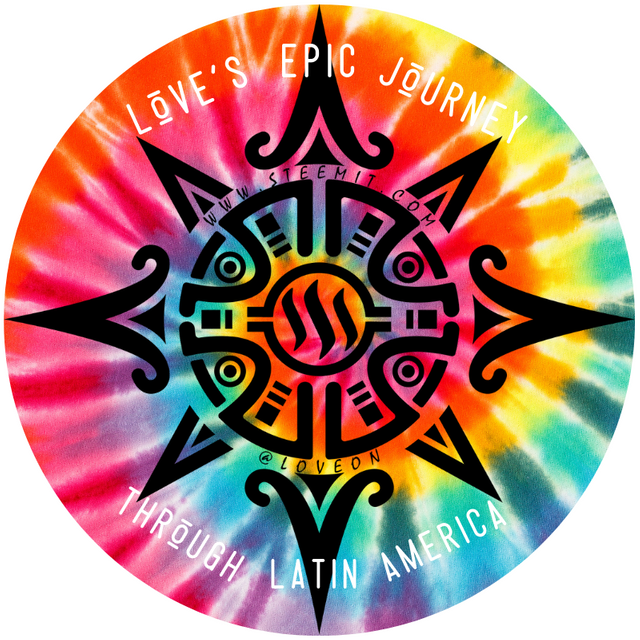
Great article I'm just starting to get into Tarot. Are those Amazon affiliate links? If so, I don't want to be nosy, do you get many clicks coming from Steemit? I will be sure to use your link to buy some Thoth deck cards when I get paid
Yes, those are Amazon affiliate links. I am grateful that you are making an intention to click through my links. I just started putting them in my blogs when I started this series of blogs. So, not so much action yet.
Be sure to check out the previous 4 blogs. There are links to those in this blog. Remember to Follow. There are 5 more tarot blogs coming in this series?